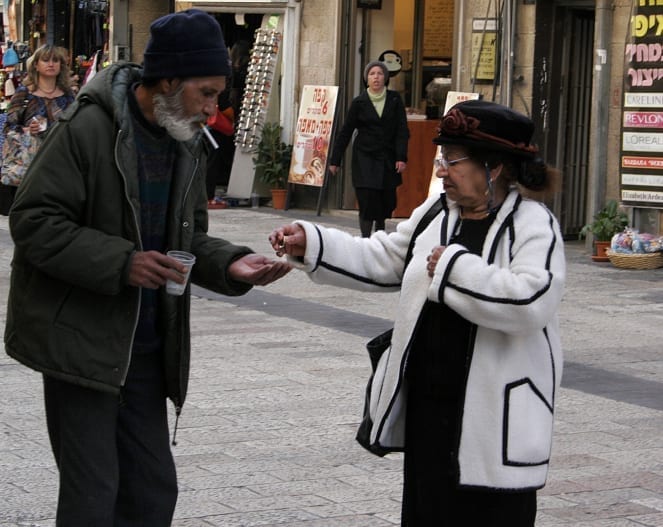Rochel Esther Shanik is a tough woman to get on the phone. Actually, that’s not completely true. You can get her on the phone, but you will most likely be one of at least two other calls she’s taking at the same time. While we chat, we’re interrupted at least once every two or three minutes by a beep on the other line, either someone calling to coordinate Tehillim, finalize tzedakah collections, or one of her children calling to check in. With her characteristic good humor, she says, “I always tell everyone, call me late when nobody [else] calls!” Lakewood’s paragon of chesed, Mrs. Shanik is as busy as any high-powered CEO, overseeing collections for Ahavas Tzedakah, a foundation that provides basic essentials like food, clothing and vouchers to purchase Shabbos and Yom Tov necessities for struggling families in the Lakewood community. She also spearheads the Sarah Lowenthal Shidduch Group, an organization she founded that maintains a database to set up singles (“The first shidduchim I made [30 years ago] I had written out on paper!” she says), builds lending libraries in different schools as well as her own home (“Because I love [books],” she says), prepares packages with food and reading material for cholim and new mothers, and coordinates Tehillim for cholim on her Tehillim hotline—all while “Bubbie-sitting” for her grandchildren.

She’s the type of person you might envy for her tireless energy and drive to do mitzvos…if only she wasn’t so nice. Born to a Modern Orthodox family in Long Beach, New York, Mrs. Shanik was the fourth generation of a family with a reputation for chesed. “It all came from my home,” she says with the speed of a perpetually busy person. “My grandmother, a”h, used to tell me stories about…how her parents used to do hachnasas orchim. They never refused anybody…in their Lower East Side tenement. They had a big family…when guests came they would sleep on the roof.” Her grandmother, though not a rich woman, always gave tzedakah to whomever needed it: “She never said no to anyone…She would stay up late addressing tzedakah envelopes.” Mrs. Shanik’s parents, also, were well-known for their generosity. Her father, who had built a successful accounting business from the ground up, was a true baal tzedakah. “He had a heart of gold,” says Mrs. Shanik. “He gave to everybody. When our shul…needed a building, no one volunteered. My father said, ‘Okay, Rabbi, how much do you need?’ And he just wrote a check. He did that all the time. People needed this, people needed that. ‘Okay, what do you need?’ And he’d write a check.” When he saw someone in need of a job, he would hire them to work in his accounting firm—even if there wasn’t actually anything for them to do. “He’d hire people at the firm who mamash did nothing; he hired them because they needed a job.” Young Rochel Esther would often rely on her family name when collecting for tzedakah on her block: “When I’d ask, people would give me. ‘Oh, it’s Mr. Wiener’s daughter!’” Surrounded by such powerful examples, it was natural that Mrs. Shanik would gravitate toward chesed. “I always enjoyed doing chesed, helping, volunteering,” she said. Aside from collecting tzedakah, in her teens she would visit the elderly—“Old people liked me, and I liked them” —and tutor fellow students who were struggling academically.
Even today, she tutors children in her home, free of charge (she holds a master’s degree in special education). She also teaches shiurim in her home and learns over the phone as a Partner in Torah. After her marriage to Dr. Robert Shanik, now one of Lakewood’s most popular pediatricians, Mrs. Shanik began attending shiurim at Mrs. Freifeld’s seminary (at the time, they were living in Great Neck, where Dr. Shanik was doing his residency). Soon enough, she was inspired to move her new family to Lakewood, a community “where everything revolves around Torah.” She wasn’t there long before a woman in town began calling her to help collect tzedakah. At the time, Mrs. Shanik had just had her second child, but “she persistently called me. I couldn’t say no anymore.” She called the names on what was then a very short list of Lakewood community members to ask if they would give, then she would drive with her baby in the car to go pick up the donations. Eventually, Mrs. Shanik began receiving calls about families who needed help, and so the organization grew. Over 30 years later, Ahavas Tzedakah is a huge, professional charity foundation. Mrs. Shanik often has people contacting her to thank her for her work and telling her what a difference it’s made in their lives. Despite her many accomplishments, Mrs. Shanik is unfailingly humble. When I told her of the many admirers who sang her praises to me, she laughed and said, “They must be dreaming.” It’s a marvel she has the time, let alone the energy, to do the many things she does each day for other people. But, she says, “when you want to do something, Hashem just gives you siyata dishmaya…[He] always helps me find out about people [in need].” And when duty calls, as it’s calling at 11 p.m., she answers. “I have to run and finish setting up the Tehillim,” she tells me before we say goodbye. As I get ready to turn in for the night, I think of Rochel Esther Shanik, who will probably be awake, holding up the world, well after I’m asleep.





